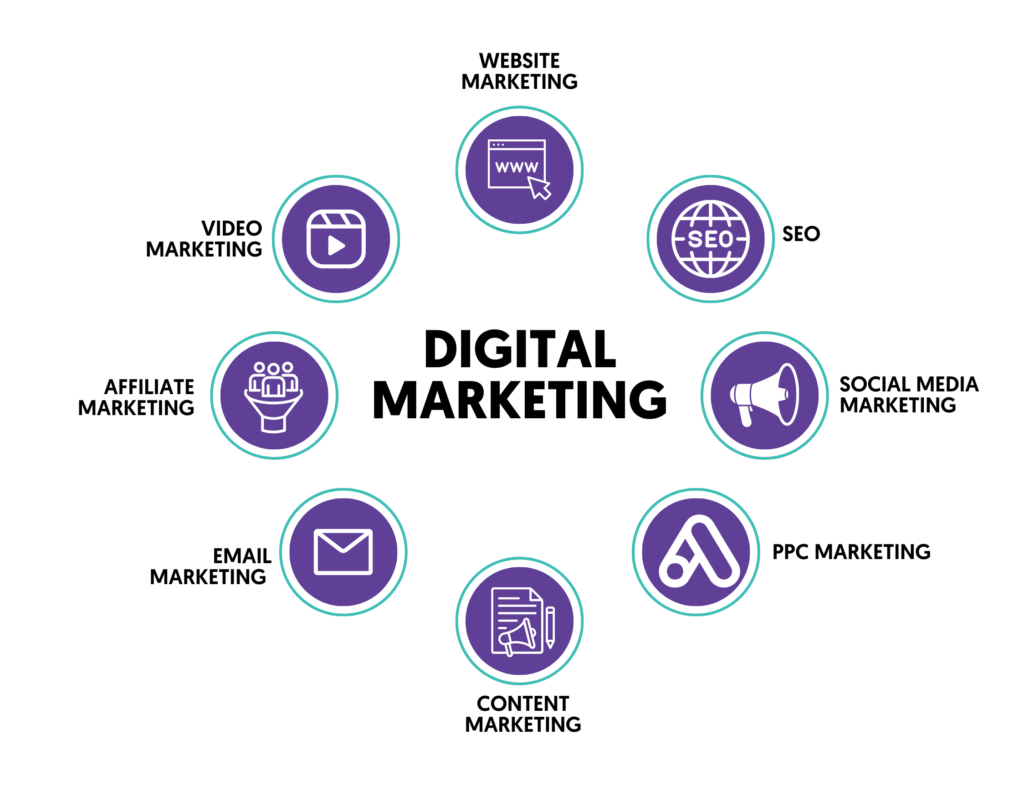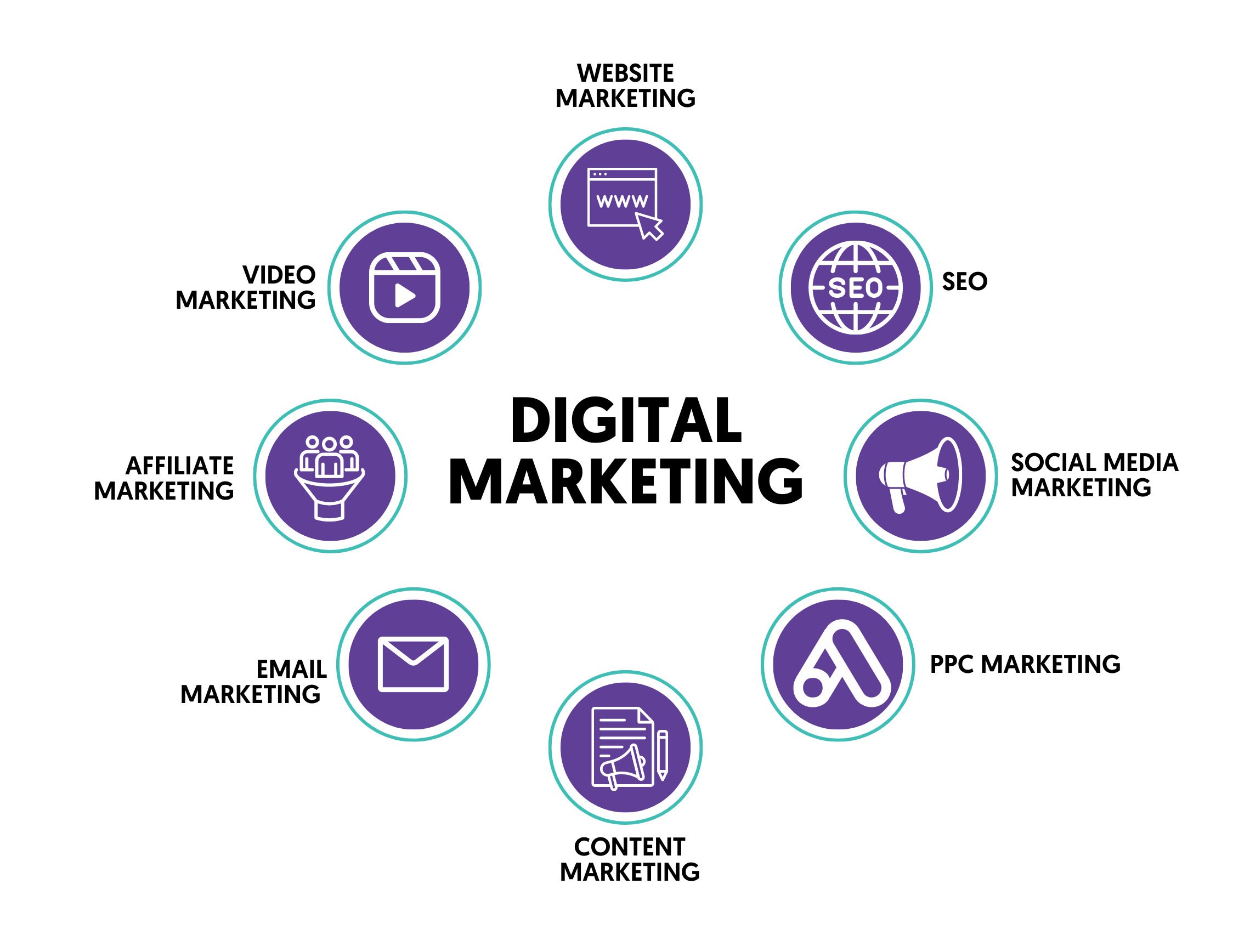
Why Digital Marketing is the Language of Opportunity
In today’s digital age, understanding the basics of digital marketing is like learning a new language—one that opens doors to endless possibilities. Whether you’re a small business owner, an aspiring influencer, or simply someone looking to make an impact online, digital marketing gives you the tools to reach your audience effectively.
Yet, with all the terms like SEO, PPC, and CTR, it can feel overwhelming. In this article, we’ll break down these essentials so you can understand and speak the language of digital marketing confidently. And, as always, our team at Skom Enterprises is here to help you turn this knowledge into actionable strategies that grow your brand and bring in results.
1. SEO (Search Engine Optimization): The Foundation of Visibility
What is it? Search Engine Optimization, or SEO, is all about improving your website so that it ranks higher on search engine results pages (SERPs), particularly on Google. Think of SEO as the strategy to make sure people find you when they search for something related to your brand or product.
Why it matters: Good SEO helps you attract organic (free) traffic to your website, leading potential customers directly to your content or products. It’s one of the most sustainable and effective ways to grow your digital presence.
Key Terms:
- Keywords: Specific words or phrases people use in search engines. By including relevant keywords in your content, you can improve your ranking.
- Backlinks: Links from other websites to yours. They act as “votes of confidence” for search engines, helping you rank higher.
- On-Page SEO: Optimization tactics applied directly to your website, like keyword use, content quality, and meta tags.
Tip for Success: Focus on quality over quantity. Create content that’s genuinely helpful to your audience, and SEO will work for you.
2. Content Marketing: Engaging and Educating Your Audience
What is it? Content marketing is all about creating and sharing valuable content that engages, educates, and inspires your audience. Blogs, videos, podcasts, infographics, and social media posts all fall under content marketing.
Why it matters: Content marketing builds trust and positions you as an authority in your industry. When people see that you’re consistently offering valuable insights, they’re more likely to trust and engage with your brand.
Key Terms:
- Evergreen Content: Content that remains relevant over time, bringing in consistent traffic.
- Content Calendar: A schedule for when and where you’ll publish your content.
- Calls-to-Action (CTAs): Phrases or prompts that encourage your audience to take a specific action, like subscribing, purchasing, or sharing.
Tip for Success: Always put your audience’s needs first. Create content that answers their questions, solves their problems, or makes them think.
3. Social Media Marketing: Building a Community and Brand Loyalty
What is it? Social media marketing involves using platforms like Facebook, Instagram, LinkedIn, and Twitter to reach your audience, build relationships, and promote your brand.
Why it matters: Social media gives you a direct line to your audience, allowing for engagement and feedback in real-time. It’s also an excellent way to increase brand awareness and loyalty.
Key Terms:
- Engagement Rate: A measure of how people interact with your content (likes, comments, shares). Higher engagement indicates a strong connection with your audience.
- Influencer Marketing: Partnering with popular social media personalities to promote your brand.
- Social Proof: The idea that people are more likely to trust a brand if others vouch for it, such as through reviews or testimonials.
Tip for Success: Focus on quality over quantity. Choose a few platforms where your target audience is active and invest time in building meaningful relationships there.
4. Pay-Per-Click (PPC) Advertising: Reaching the Right Audience Fast
What is it? PPC advertising is a form of paid advertising where you pay a fee each time someone clicks on your ad. Google Ads and social media ads are popular PPC options.
Why it matters: PPC is a quick and effective way to reach a targeted audience. You can tailor your ads to specific demographics, ensuring that your message reaches the right people.
Key Terms:
- CPC (Cost Per Click): The amount you pay each time someone clicks on your ad.
- CTR (Click-Through Rate): The percentage of people who clicked on your ad after seeing it.
- Conversion Rate: The percentage of people who take a desired action, like making a purchase or signing up.
Tip for Success: Optimize your PPC ads by testing different versions (A/B testing) to see what resonates best with your audience.
5. Email Marketing: Staying Top-of-Mind with Your Audience
What is it? Email marketing involves sending targeted messages directly to your audience’s inbox. It’s a personal and effective way to nurture relationships, share updates, and drive sales.
Why it matters: Email marketing has one of the highest returns on investment (ROI) of any marketing channel. With emails, you can segment your audience and send messages that are highly relevant to them.
Key Terms:
- Open Rate: The percentage of people who open your email.
- Segmentation: Dividing your email list into specific groups based on demographics, interests, or behavior.
- Drip Campaign: A series of automated emails sent over time to guide the audience through a journey.
Tip for Success: Focus on building an email list that’s genuinely interested in your brand. Sending valuable content keeps your audience engaged and less likely to unsubscribe.
6. Analytics: Measuring and Improving Your Efforts
What is it? Analytics involves using data to track the performance of your digital marketing campaigns. With analytics tools, you can understand what’s working, what’s not, and where you can improve.
Why it matters: Data-driven insights help you make informed decisions, ensuring you get the most out of your marketing efforts.
Key Terms:
- Bounce Rate: The percentage of visitors who leave your site after viewing only one page.
- Conversion Rate: The percentage of visitors who complete a desired action, like making a purchase.
- KPIs (Key Performance Indicators): Metrics that help you measure the success of your campaigns, such as traffic, leads, and engagement.
Tip for Success: Regularly review your analytics to identify trends and areas for improvement. Make adjustments to optimize performance.
7. Branding: Building a Memorable and Trustworthy Presence
What is it? Branding goes beyond a logo or color scheme; it’s the perception that your audience has of your company. A strong brand creates loyalty, recognition, and trust.
Why it matters: In a competitive digital landscape, a unique and consistent brand can make the difference between being forgotten and being top-of-mind.
Key Terms:
- Brand Voice: The tone and style of your messaging, which reflects your brand’s personality.
- Visual Identity: The design elements like logo, colors, and typography that make your brand instantly recognizable.
- Brand Loyalty: The degree to which customers are committed to your brand and unlikely to switch to competitors.
Tip for Success: Stay consistent with your branding across all platforms. A cohesive look and feel strengthen your audience’s connection to your brand.
How Skom Enterprises Can Help You Decode Digital Marketing
At Skom Enterprises, we understand that digital marketing can seem like a foreign language. That’s why we’re here to help you navigate each step, from building your brand identity to optimizing your social media presence. Here’s how we can support you:
- Lead Generation: Reach and connect with potential customers.
- Search Engine Optimization (SEO): Boost your visibility and ranking.
- Pay-Per-Click (PPC) Advertising: Drive targeted traffic to your website.
- Content Marketing: Engage your audience with valuable, insightful content.
- Social Media Management: Build your online community and brand loyalty.
- Website Development: Create a professional, user-friendly site that reflects your brand.
- Email Marketing: Keep your audience engaged and nurture leads.
Speaking Digital Marketing Like a Pro
The essentials of digital marketing may seem complex at first, but with the right mindset and support, you can master the language and start making a meaningful impact online. By understanding SEO, content marketing, social media, and more, you’re equipped with the foundation to succeed in today’s digital world.
Ready to speak the language of digital marketing fluently? Let’s get started on this journey together with Skom Enterprises. We’re here to help you not just learn, but thrive.
Let’s unlock your digital marketing potential—reach out to us today and watch your brand soar!


Leave a Reply